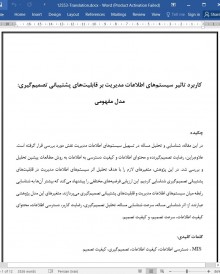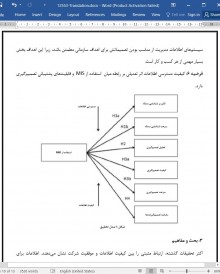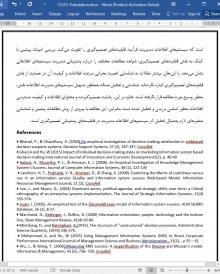
دانلود مقاله کاربرد تاثیر سیستم های اطلاعات مدیریت بر قابلیت های پشتیبانی تصمیم گیری
چکیده
در این مقاله، شناسایی و تحلیل مساله در تسهیل سیستمهای اطلاعات مدیریت نقش مورد بررسی قرار گرفته است. علاوهبراین، رضایت تصمیمگیرنده و محتوای اطلاعات و کیفیت دسترسی به اطلاعات به روش مطالعات پیشین تحلیل و بررسی شد. در این پژوهش، متغیرهای لازم را با هدف تحلیل اثر سیستمهای اطلاعات مدیریت در قابلیتهای پشتیبانی تصمیمگیری شناسایی کردیم. این ارزیابی فرضیههای مختلفی را پیشنهاد میکند که بیشتر آنها به شناسایی رابطه میان سیستمهای اطلاعات مدیریت و قابلیتهای پشتیبانی تصمیمگیری میپردازند. متغیرهای این مدل پژوهشی عبارتند از: اثر شناسایی مساله، سرعت شناسایی مساله، تحلیل تصمیمگیری، رضایت کاربر، دسترسی اطلاعات، محتوای کیفیت اطلاعات، سرعت تصمیم، و کیفیت تصمیم.
1: مقدمه
قابلیتهای تصمیمگیری در تمام زمینههای عملکرد محبوب است. با توجه به پیشرفتهایی در زمینههای فنی قرن، اکثر شرکتهای تجاری با هدف موفقیت در آینده، شیوه سنتی کسب و کار را به سطح مدرن میرسانند. امروزه، عملکرد موفق یک شرکت، نهتنها قابلیت تولید محصولات مورد تقاضای مشتریان را محدود نمیکند، بلکه موجب تصمیمگیریهای درست و مهمی میشود که برای موفقیت و پایداری آینده کسب و کار، ضروری است. بنابراین، به منظور تضمین اطمینانپذیری و سازگاری تصمیمات با اهداف شرکت، اکثر کسب و کارها به فرآیند خودکار قابلیتهای تصمیمگیری تبدیل میشوند. مخصوصا، استفاده روزافزون سیستمهای اطلاعات مدیریت در این مورد. بنابر دیدگاههای مختلف، سیستمهای اطلاعات مدیریت برای عملکرد شرکتها مفید است. یکی از مزایای واضح سیستمهای اطلاعات مدیریت از لحاظ مشارکت آنها در فرآیند تصمیمگیری است. مطالعات بسیاری هنگام تحلیل اثر سیستمهای اطلاعات مدیریت در فرآیند تصمیمگیری، به رابطه مثبتی رسیدند. اعتقاد براین است که سیستمهای اطلاعات مدیریت، فرآیند قابلیتهای تصمیمگیری را تقویت میکند. بررسی ادبیات قبلی، شواهدی از مطالعات مختلف را درباره پشتیبانی سیستمهای اطلاعات مدیریت و کمک آن به نقش قابلیتهای تصمیمگیری نشان میدهد. با اینحال، اکثر مقالات به شناسایی اهمیت بحرانی سرعت اطلاعات و کیفیت آنها در پشتیبانی از نقش قابلیتهای تصمیمگیری اشاره نکردهاند. شناسایی و تحلیل مساله در تسهیل نقش سیستمهای اطلاعات مدیریت بهطور وسیعتری مطالعه و بررسی نشده است. علاوهبراین، رضایت تصمیمگیرنده، محتوای اطلاعات و کیفیت دسترسی اطلاعات بهطور اساسی تحلیل و بررسی نشده است. بنابراین، مطالعه حاضر با استفاده از روش مطالعات پیشین و شناسایی متغیرهای لازم، بهدنبال تحلیل اثر سیستمهای اطلاعات مدیریت در قابلیتهای تصمیمگیری است. این پژوهش، فرضیههای مختلفی را پیشنهاد میکند که اکثر آنها بهدنبال شناسایی رابطه میان سیستمهای اطلاعات مدیریت و قابلیتهای پشتیبانی تصمیمگیری با استفاده از متغیرهای مختلف است. همانطور که در مدل پژوهشی مطرح شد، برخی متغیرها عبارتند از : تاثیر تعریف مساله، سرعت شناسایی مساله، تحلیل تصمیمگیری، رضایت کاربر، دسترسی اطلاعات، محتوای کیفیت اطلاعات، سرعت تصمیم و کیفیت تصمیم. تحلیل سیستمهای اطلاعات مدیریت برای پروژههای بلندمدت و کوتاهمدت ضروری است. بنابراین، به برخی از نکات مهم باید توجه شود.
4: نتیجهگیری
طبق گزارشات، سیستمهای اطلاعات مدیریت از دیدگاههای مختلفی برای عملکرد شرکت سودمند است. یکی از مزایای آشکار سیستمهای اطلاعات مدیریت از لحاظ کمک به فرآیند تصمیمگیری آنها قابل مشاهده است. مطالعات بسیاری هنگام تحلیل اثر سیستمهای اطلاعات مدیریت در فرآیند تصمیمگیری، به رابطه مثبتی دست یافتهاند. اعتقاد بر این است که سیستمهای اطلاعات مدیریت، فرآیند قابلیتهای تصمیمگیری را تقویت میکند. بررسی ادبیات پیشین با کمک به نقش قابلیتهای تصمیمگیری، شواهد مطالعات مختلف را درباره پشتیبانی مدیریت سیستمهای اطلاعاتی نشان میدهد. با اینحال، بیشتر مقالات به شناسایی اهمیت بحرانی سرعت اطلاعات و کیفیت آن در حمایت از نقش قابلیتهای تصمیمگیری اشاره نکردهاند. شناسایی و تحلیل مساله بهمنظور تسهیل سیستمهای مدیریت اطلاعات نقش، بهطور وسیع مورد مطالعه قرار نگرفته است. علاوه بر این، رضایت تصمیمگیرنده و محتوای اطلاعات و کیفیت دسترسی اطلاعات بهطور اساسی بررسی و تحلیل نشده است. بنابراین، این مطالعه با پیروی از روش مطالعات پیشین و شناسایی متغیرهای لازم بهدنبال تحلیل اثر سیستمهای اطلاعات مدیریت در قابلیتهای پشتیبانی تصمیمگیری است.
Abstract
In this article, the identification and the analysis of the problem in facilitating the role management information systems have been studied. Moreover, the decision maker’s satisfaction and content of information and information access quality have been critically analyzed and studied following the methodology of the previous studies. We identified necessary variables aiming to analyze the influence of management information systems in decision support capabilities. Precisely, this investigation proposes different hypotheses most of which aims to identify the relationship between management information systems and decision support capabilities. The variables included in the research model are the impact on problem definition, speed of problem identification, decision-making analysis, user satisfaction, information access, the content of information quality, decision speed, and decision quality.
1. Introduction
Decision-making capabilities are becoming popular in all spheres of operations. Due to the advances in the technological areas of the century, most of the businesses, which aim for the success in future, are turning traditional way of doing business into the modern area. Today, successful operation of the firm is not only limited by its ability to produce the products that consumers demand, but also reaching right and important decisions that are vital for the future stability and prosperity of the business. Therefore, most businesses are turning into the automated process of decision-making capabilities in order to ensure the reliability and suitability of the decisions with company goals. Particularly, it is worth to mention the increasing usage of management information systems in this case. Management information systems are reported to be beneficial for the operations of the company from different perspectives. One of the obvious benefits of management information systems is observed in terms of their contribution in decision-making process. Many studies have discovered positive relationship while analyzing the impact of management information systems in decision-making process. Management information systems are believed to foster the process of decision-making capabilities. The review of the previous literature shows the evidence of various studies in support of management of information systems in contributing to the role of decision-making capabilities. However, most of the paper lacks in identifying the critical importance of information speed and its quality in supporting the role of decision-making capabilities. The identification and the analysis of the problem in facilitating the role of management information systems have not been studied to a greater extent. Moreover, the decision maker’s satisfaction and content of information and information access quality have not been critically analyzed and studied. Thus, following the methodology of the previous studies and identifying necessary variables, the current study aims to analyze the influence of management information systems in decision support capabilities. Precisely, this investigation proposes different hypotheses most of which aims to identify the relationship between management information systems and decision support capabilities through different variables. Some of the variables include as proposed in research model are the impact on problem definition, speed of problem identification, decision-making analysis, user satisfaction, information access, the content of information quality, decision speed, and decision quality. The analyses of management information systems are crucial for the short and long term projects of the company. Thus, some important implications are to be taken into account.
4. Conclusion
Management information systems are reported to be beneficial for the operations of the company from different perspectives. One of the obvious benefits of management information systems is observed in terms of their contribution in decision-making process. Many studies have discovered positive relationship while analyzing the impact of management information systems in decision-making process. Management information systems are believed to foster the process of decision-making capabilities. The review of the previous literature shows the evidence of various studies in support of management of information systems in contributing to the role of decision-making capabilities. However, most of the paper lacks in identifying the critical importance of information speed and its quality in supporting the role of decision-making capabilities. Particularly, the identification of problem and analysis of the problem in facilitating the role management information systems have not been studied largely. Moreover, the decision maker’s satisfaction and content of information and information access quality have not been critically analyzed and studied. Thus, following the methodology of the previous studies and identifying necessary variables the current study aims to analyze the influence of management information systems in decision support capabilities.
چکیده
1: مقدمه
2: ساختار مدل مفهومی
3: بحث و مفاهیم
4: نتیجهگیری
منابع
AB ST R ACT
1. Introduction
2. Conceptual Model Construction
3. Discussion and Implications
4. Conclusion
References
- اصل مقاله انگلیسی با فرمت ورد (word) با قابلیت ویرایش
- ترجمه فارسی مقاله با فرمت ورد (word) با قابلیت ویرایش، بدون آرم سایت ای ترجمه
- ترجمه فارسی مقاله با فرمت pdf، بدون آرم سایت ای ترجمه



